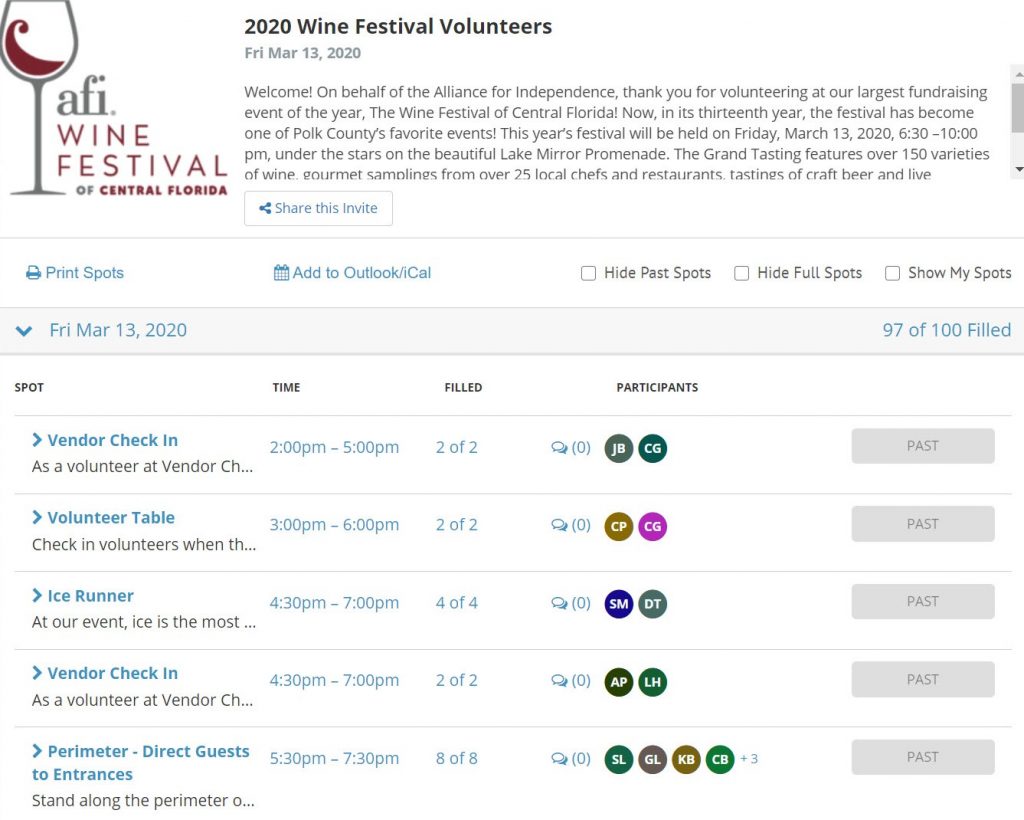Spring event season is here! Whether you host virtual events or are back to hosting (safe) in-person events, you’ll need volunteers. Your event staff and volunteers are responsible for delivering a great guest experience. A disorganized and confused staff can bring even the most fun fundraiser to a screeching halt. You can avoid party fouls by making staff assignments that match the skills and interests of your staff.
Here are three tips on staff assignments that will take your fundraising event management to the next level:
1. Figure out what roles are needed
During event planning, determine what roles you’ll need to fill to deliver a well-coordinated event experience. Good nonprofit event management requires accurately determining how many volunteers you need and what roles need to be filled. A 100% virtual event will require fewer roles, while hybrid and in-person events can require a wide range of staff sizes depending on the event activities and the size of your guest list. Consider these questions when determining what roles are needed.
- How many guests are you expecting? This determines the number of volunteers you’ll need for the check-in table
- Are you running sub-events during the event? How many people are needed to run these sub-events?
- Is event setup and tear down complicated for this event? How many volunteers do you anticipate you’ll need to get your event up and running on time?
- Are you serving food or drinks during the event? How many staff members are needed to ensure everyone gets served with minimal wait times?
Additionally, think of your behind-the-scenes needs.
- Is there someone to manage tech?
- Do you have a cameraperson to record fun events to share on social media or on a livestream?
- Did you appoint charismatic MCs to host the event?
- Is your social media coordinator going to be live tweeting and posting regular event updates throughout the event?
- Are you going to deliver goodie bags and meal kits to virtual attendees? If so, who will deliver them?
When you know what roles you need, it makes it easier to determine the skills necessary for each role. You wouldn’t choose a shy person to act as your greeter. On the other hand, a charismatic coworker or board member could be a perfect event host.
When you request volunteers and describe the available roles, include a list of skills needed for each role to help your supporters determine which staff assignments match their personality and skill set.
2. Get to know your volunteers
Another tip for successful fundraising event management is knowing your volunteers’ skills and interests and placing them in matching roles. Ask volunteers to complete a questionnaire or take time to have a conversation with your event staff about what their interests are. By the end of the conversation you should know:
- What skills your volunteers bring to the table
- What your volunteers are interested in doing
- If there are any tasks a volunteer can’t or won’t do
- Which staff members are introverted and which are extroverted
- This helps determine if they’d be most successful in a public-facing role or with behind-the-scenes responsibilities
Alternatively, you could encourage event volunteers to choose their own staff assignments. That’s what a local Qgiv client, Alliance for Independence, does with their annual Food and Wine Festival. They post the roles they need to fill on a website along with different time slots. Volunteers sign up for the jobs and times that best match what they’re looking to do and when they want to do it.
Their event is massive and requires a lot of volunteers to be successful. Though they encourage volunteers to choose the jobs they perform, they always appoint great volunteer managers to get everyone on the same page and performing their roles well. A great fundraising event management tip is to appoint volunteer mentors who can train volunteers and be their main point of contact during the event.
Please note: The image below is from AFI’s 2020 event, which they postponed due to COVID-19 in the interest of keeping staff and supporters safe and healthy.

3. Communicate staff assignments and train staff
Whether you choose the staff assignments or ask prospective volunteers to choose their own role, you’ll need to communicate with them about their assignment. Clearly explain their responsibilities, the skills required, and confirm the event date and time that the volunteer will report for. Clear communication is key for fundraising event management.
Once you’ve assigned staff roles, call or email staff to confirm their participation in the event and communicate their assignment. When reaching out initially, set up a virtual training or safe, socially distanced on-site staff training (if required) to prepare volunteers for their assigned roles. You wouldn’t show up to perform in a play without a rehearsal, so you shouldn’t expect that of volunteers.
Ask volunteers to report for a dress rehearsal a day or two before the actual event to have them act out their staff assignment. Check out this great webinar presented by Kaylee Williams of VolunteerLocal to learn how to manage volunteers perfectly.
Lastly, if there are objections to staff assignments, determine if there is some flexibility with the event staff roster. If possible, attempt to accommodate requests. If you can’t accommodate the staff member, assure them you’ll make a note of their interest in the alternative role for next year. Keeping event volunteers in your good graces keeps them coming back to help at future events.
Conclusion
Your event staff can make a world of difference when hosting a fundraising event. Avoid confusion and delays by assigning staff to roles that meet their skillset and interests. Then, thoroughly train staff members in their roles ahead of the event.
Want more tips and tricks to improve your nonprofit’s fundraising event management? We’ve got you covered! Check out our article on how to make the most of your event venue. The post covers how to manage your venue regardless of whether your event is in-person, hybrid, or 100% virtual.







